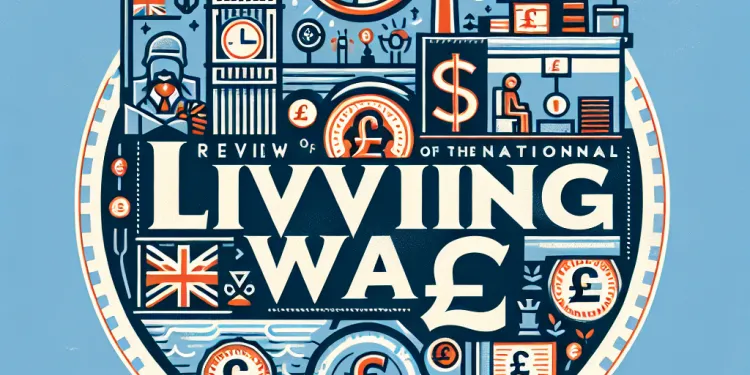
Find A Professional
More Items From Ergsy search
-

Is the Living Wage Foundation's rate the same as the National Living Wage?
Relevance: 100%
-

How can I calculate my new earnings based on the National Living Wage increase?
Relevance: 97%
-

Who is eligible for the National Living Wage?
Relevance: 89%
-

How does the National Living Wage differ from the National Minimum Wage?
Relevance: 89%
-

How does the UK National Living Wage compare internationally?
Relevance: 86%
-

What is the new UK National Living Wage for 2026?
Relevance: 84%
-

Why is the National Living Wage being increased?
Relevance: 83%
-

How is the National Living Wage calculated?
Relevance: 83%
-

UK national living wage increase 2026
Relevance: 83%
-

Are employers legally required to pay the National Living Wage?
Relevance: 81%
-

How often is the National Living Wage reviewed?
Relevance: 80%
-

Where can I find official announcements on the National Living Wage?
Relevance: 79%
-

Are zero-hour contract workers entitled to the National Living Wage?
Relevance: 74%
-

Are apprentices entitled to the National Living Wage?
Relevance: 74%
-

How often do wage rates change in the UK?
Relevance: 63%
-

Liver disease | NHS
Relevance: 59%
-

What happens if an employer pays below the National Living Wage?
Relevance: 56%
-

Will the increase in the National Living Wage affect inflation?
Relevance: 52%
-

What are National Trust Jobs?
Relevance: 36%
-

Does the National Living Wage increase mean my taxes will change?
Relevance: 36%
-

What is the National Trust?
Relevance: 33%
-

What types of positions are available at the National Trust?
Relevance: 33%
-

What is a live-attenuated vaccine?
Relevance: 33%
-

Can I receive this payment alongside other cost of living payments?
Relevance: 31%
-

Can I get a job with the National Trust if I am a student?
Relevance: 30%
-

Liver transplant - Patient experience - Part 1 (Colin)
Relevance: 29%
-

Is prior experience required to work at the National Trust?
Relevance: 29%
-

What is the £500 cost of living payment?
Relevance: 28%
-

Can I work for the National Trust part-time?
Relevance: 27%
-

What age do you have to be to work at the National Trust?
Relevance: 27%
-

How does the National Trust support career development?
Relevance: 27%
-

Is there a change in National Insurance rates for 2026?
Relevance: 27%
-

Does the National Trust offer internships?
Relevance: 26%
-

Do I need to pay tax on the £500 cost of living payment?
Relevance: 25%
-

Where can I find reviews from current or past National Trust employees?
Relevance: 25%
-

Where can I find more information about the £500 cost of living payment?
Relevance: 25%
-

Are there seasonal jobs with the National Trust?
Relevance: 25%
-

How can I apply for a job at the National Trust?
Relevance: 24%
-

Impact of Cost of Living on UK Communities
Relevance: 24%
-

Can international applicants apply for jobs at the National Trust?
Relevance: 24%
Introduction to the National Living Wage
The National Living Wage (NLW) in the United Kingdom is a minimum amount per hour that workers aged 23 and over are legally entitled to be paid. Introduced in April 2016, the NLW aims to improve the standard of living for low-income workers by providing a wage that reflects the costs of living. The rate is reviewed annually and takes into account various socio-economic factors to ensure fairness and adequacy.
Government Involvement
The UK government is primarily responsible for setting the National Living Wage rate. This process involves several governmental branches, with the Department for Business, Energy & Industrial Strategy (BEIS) playing a key role. BEIS works closely with independent bodies to review and adjust the rate as necessary, ensuring it remains relevant to economic conditions.
The Role of the Low Pay Commission
The Low Pay Commission (LPC) is an independent body tasked with providing recommendations to the government about the NLW rate. Consisting of experts from various fields such as economics, business, and labor organizations, the LPC conducts extensive research and consultation with stakeholders, including employers, trade unions, and workers. The LPC’s recommendations are based on evidence gathered from these consultations and an analysis of economic data.
Factors Considered in Calculation
Several factors are considered when calculating the National Living Wage. These include inflation rates, average earnings, and economic growth. The LPC also considers the employment rate and the potential impact of any changes to the NLW on both the workforce and businesses, especially smaller enterprises. The goal is to find a balance where wages are fair for workers but sustainable for employers.
Annual Review Process
The process of reviewing the National Living Wage starts with the LPC conducting its research and gathering evidence, which usually begins several months before any changes are announced. This process includes data analysis, collection of real-world evidence, and collaboration with stakeholders. After formulating its recommendations, the LPC submits a report to the government, usually in the autumn. The government then reviews these recommendations before announcing any changes, which typically come into effect from the following April.
Impact on Workers and Employers
The goal of the National Living Wage is to improve living standards for workers by ensuring fair pay in relation to living costs. For employers, particularly small businesses, the challenge lies in managing increased payrolls while maintaining business viability. The LPC and the government aim to mitigate these challenges through careful adjustment and phased implementation of wage changes.
Conclusion
The National Living Wage is a vital component of the UK’s approach to fair labor compensation. By regularly reviewing and adjusting the rate based on a broad range of economic indicators and evidence, the UK government and the Low Pay Commission aim to ensure that the NLW continues to serve its purpose effectively, supporting both workers and businesses in a dynamic economic environment.
Introduction to the National Living Wage
The National Living Wage (NLW) in the United Kingdom is the least amount of money workers aged 23 and over must be paid for each hour they work. It started in April 2016 to help workers earn enough money to live well. Every year, the NLW is checked and changed to make sure it is fair and enough for people to live on.
Government Involvement
The UK government decides how much the National Living Wage should be. Many government groups help with this, especially the Department for Business, Energy & Industrial Strategy (BEIS). They work with experts to make sure the NLW is right for the country's economy.
The Role of the Low Pay Commission
The Low Pay Commission (LPC) is a group of experts who tell the government what the NLW rate should be. These experts come from different places like economics, business, and worker organizations. They listen to what employers, workers, and unions have to say, look at data, and use this information to give advice about the NLW.
Factors Considered in Calculation
When deciding the National Living Wage, many things are thought about, like how much prices have gone up, the average pay for workers, and how the economy is growing. The LPC also looks at how changes might affect jobs and businesses, especially small ones. The aim is to make wages fair for workers but not too hard for businesses to pay.
Annual Review Process
The Low Pay Commission starts looking into the National Living Wage many months before any changes are made. They gather information and talk to people to understand what is happening in the real world. After studying the data, they make suggestions to the government in the autumn. The government then decides the new NLW, which starts in April the next year.
Impact on Workers and Employers
The National Living Wage helps workers by making sure they get paid fairly. For businesses, especially small ones, it means they need to pay more to their workers, which can be hard. The government and LPC try to make this easier by changing wages slowly and carefully.
Conclusion
The National Living Wage is important for making sure workers get paid fairly in the UK. By regularly checking and adjusting the rate, the government and the Low Pay Commission aim to help both workers and businesses succeed even when the economic situation changes.
Frequently Asked Questions
What is the National Living Wage?
The National Living Wage is the minimum hourly pay rate set by the government for workers aged 23 and over in the UK.
How is the National Living Wage calculated?
The National Living Wage is calculated based on recommendations from the Low Pay Commission, taking into account economic conditions and the cost of living.
Who sets the National Living Wage?
The National Living Wage is set by the UK government, following recommendations from the Low Pay Commission.
How often is the National Living Wage updated?
The National Living Wage is reviewed and updated annually.
Who advises the government on the National Living Wage?
The Low Pay Commission advises the government on the appropriate level for the National Living Wage.
What factors influence the calculation of the National Living Wage?
Factors include current economic conditions, inflation, employment rates, and the cost of living.
When does a change in the National Living Wage usually take effect?
Typically, changes to the National Living Wage take effect in April each year.
Is the National Living Wage different from the minimum wage?
Yes, the National Living Wage is specifically for workers aged 23 and over, while the minimum wage includes different rates for younger workers.
Does the National Living Wage vary by region?
No, the National Living Wage is a national rate and does not vary by region.
Are all workers eligible for the National Living Wage?
All workers aged 23 and over are eligible, except for those in certain apprenticeship schemes, the armed forces, and other exclusions.
How does inflation affect the National Living Wage?
Inflation is a key factor considered in setting the National Living Wage to ensure that pay keeps pace with living costs.
Can employers pay less than the National Living Wage?
No, employers are legally required to pay at least the National Living Wage to eligible workers.
What happens if an employer does not pay the National Living Wage?
Employers who do not pay the required National Living Wage can face financial penalties and legal action.
How does the National Living Wage impact small businesses?
Small businesses must plan for potential increases in wage bills due to changes in the National Living Wage.
What role does the Low Pay Commission play in determining the National Living Wage?
The Low Pay Commission researches and recommends wage levels to the government, informing decisions on the National Living Wage.
Has the National Living Wage always been in place?
No, the concept of the National Living Wage was introduced in the UK in 2016.
What is the current National Living Wage rate?
The current rate can vary by year and should be checked on the official government website or a similar reliable source.
Do part-time workers get the National Living Wage?
Yes, part-time workers aged 23 and over must receive at least the National Living Wage for hours worked.
Why is it called 'Living' Wage?
It is termed 'Living' because it aims to provide workers with an income that meets their living needs, as opposed to just a survival wage.
Can workers under 23 get the National Living Wage?
No, workers under 23 are eligible for the National Minimum Wage, which has different rates.
What is the National Living Wage?
The National Living Wage is the smallest amount of money workers aged 23 and older should get per hour. This helps people earn enough to live on.
To make reading easier, you can:
- Use a ruler or your finger to follow the words.
- Read out loud to yourself.
- Ask someone to help if you're stuck.
The National Living Wage is the smallest amount of money that workers who are 23 years old and older can be paid per hour in the UK. The government decides this amount.
How is the National Living Wage worked out?
The National Living Wage is decided by a group of people called the Low Pay Commission. They look at how the economy is doing and how much it costs to live, then decide how much it should be.
Who decides how much the National Living Wage is?
The government decides how much the National Living Wage is. This is the lowest pay workers can get by law if they are 23 or older. The government listens to experts who give advice on the right amount. Using simple tools like a calculator can help to understand how pay might change.
The National Living Wage is the amount of money people get paid for work in the UK.
The UK government decides what this amount should be. They listen to a group of people called the Low Pay Commission to help them decide.
If you find reading hard, you can use tools like text-to-speech apps that read words out loud or colored overlays to make reading easier.
How often does the National Living Wage change?
The National Living Wage changes every year.
It usually changes in April.
People can use tools or apps to get reminders.
The National Living Wage is checked and changed every year.
Who helps the government decide on the National Living Wage?
The government gets help from experts to decide the National Living Wage. These experts know a lot about money and jobs. They tell the government what the fair amount of money is for people to earn.
If you find reading hard, you can ask someone to read it with you or use a tool that reads aloud. You can also use apps that make reading easier by making the words bigger.
The Low Pay Commission gives advice to the government about what the National Living Wage should be.
What things decide how much the National Living Wage is?
Some things that can change money and jobs are:
- How the economy is doing.
- Prices getting higher (this is called inflation).
- How many people have jobs.
- How much it costs to live.
Using pictures or videos can help make this easier to understand.
When does the National Living Wage usually change?
The National Living Wage usually changes one time each year. This change often happens in April.
If you want help to remember this, you can use a calendar or set a reminder on your phone.
The National Living Wage usually changes in April every year.
Is the National Living Wage different from the minimum wage?
The National Living Wage and minimum wage are types of pay. They are for workers in the UK. But, they are not the same.
National Living Wage: This is for workers who are 23 years old or older. It's the highest amount of money.
Minimum Wage: This is for workers who are younger. People under 23 get this pay.
Tip: To learn more about your pay, you can use a calculator online. If you need help, ask a grown-up or a friend.
Yes, the National Living Wage is the pay for workers who are 23 years old and older. Younger workers have different pay rates called the minimum wage.
Do people get different pay in different places?
No, the National Living Wage is the same amount for everyone in the country. It does not change in different places.
Can every worker get the National Living Wage?
No, not everyone can get the National Living Wage. It is only for people who are 23 years or older.
If you are younger than 23, there is a different minimum wage for you.
Ask a grown-up or a friend if you need help understanding this. You can also use a reading app to help you.
If you are 23 years old or older, you can get it. But if you are in some special training programs, in the army, or a few other groups, you might not be able to get it.
What happens to the National Living Wage when prices go up?
Inflation is when prices for things go up. It is important because it affects how much money we need to buy things.
The National Living Wage is the least amount of money you can be paid per hour. We use inflation to help decide this wage. This way, people can still afford to buy what they need as prices rise.
You can use tools like text readers or highlight words you don't know to help you understand better. Talking to someone who knows more can also help.
Do bosses have to pay at least the National Living Wage?
No, bosses have to pay workers the National Living Wage by law. This is the least amount of money they can pay people who can get it.
What if a boss does not pay the National Living Wage?
If your boss does not pay you enough money, it is not right. This money is the National Living Wage.
Here is what you can do:
- Tell your boss about the problem.
- Ask someone for help, like a union or a group that helps workers.
- Use the government’s website for advice or help.
Remember, you have the right to be paid fairly. You can ask an adult you trust for help if you're not sure what to do.
If a boss does not pay the right amount of money (called the National Living Wage), they can get into trouble. They might have to pay extra money as a penalty, and they could have to deal with the law.
How does paying the National Living Wage affect small businesses?
Small businesses have to pay workers a fair wage called the National Living Wage. This might make it hard for them to save money or buy new things for the business.
Here are some ways to help small businesses:
- Use money management tools: Apps can help plan and track spending.
- Seek advice: Talk to business advisors or join a support group for tips.
- Find local grants: Look for programs that offer money to help small businesses.
Small businesses need to get ready for when they might have to pay their workers more money because of changes in how much people must be paid.
What does the Low Pay Commission do for the National Living Wage?
The Low Pay Commission is a group that helps decide how much money people should get paid. They tell the government their ideas for the right amount of pay. This helps the government decide on the National Living Wage.
Was the National Living Wage always there?
No, it wasn't always there. The National Living Wage started in 2016. Before that, people earned a different type of minimum wage. If you want help with reading, you can try using pictures or asking someone to explain it to you.
No, the National Living Wage started in the UK in 2016.
What is the National Living Wage now?
The National Living Wage is the least money you must get per hour if you are 23 or older. It means your boss has to pay you at least this much for each hour you work.
Tools to help:
- Ask someone to help explain tricky words.
- Use a calculator to figure out your pay.
- Visit official websites with trusted information.
The current rate can change each year. To find the right information, look at the official government website or another trusted source.
Do part-time workers get the National Living Wage?
Part-time workers should get the same minimum pay as full-time workers. This is called the National Living Wage.
If you work part-time, check that you get the right money. It should be the same as the National Living Wage.
If you are not sure, you can ask someone for help. You can talk to a teacher, a parent, or a manager. You can also use a calculator on a website to check your pay.
Yes, if you work part-time and you are 23 or older, you must get at least the National Living Wage for the hours you work.
Why is it called 'Living' Wage?
The 'Living' Wage is called this because it helps people pay for important things like food, rent, and clothes. It means earning enough money to have a good life.
To understand better, you can:
- Use pictures or drawings.
- Ask someone to explain with simple words.
- Use audiobooks or reading apps.
We call it 'Living' because it gives workers enough money to have a good life, not just enough to get by.
Do workers under 23 get the National Living Wage?
If you are under 23, you do not get the National Living Wage. You get a different amount called the National Minimum Wage. Here is what you can do:
- Check your age: Make sure you know how old you are.
- Ask for help: Talk to someone you trust, like a family member or a teacher, if you have questions.
- Use a calculator: There are online tools to help you check how much you should be paid.
No, if you are under 23, you will get the National Minimum Wage. This is a different amount of money.
Useful Links
- Ergsy carfully checks the information in the videos we provide here.
- Videos shown by Youtube after a video has completed, have NOT been reviewed by ERGSY.
- To view, click the arrow in centre of video.
- Most of the videos you find here will have subtitles and/or closed captions available.
- You may need to turn these on, and choose your preferred language.
- Go to the video you'd like to watch.
- If closed captions (CC) are available, settings will be visible on the bottom right of the video player.
- To turn on Captions, click settings .
- To turn off Captions, click settings again.
More Items From Ergsy search
-

Is the Living Wage Foundation's rate the same as the National Living Wage?
Relevance: 100%
-

How can I calculate my new earnings based on the National Living Wage increase?
Relevance: 97%
-

Who is eligible for the National Living Wage?
Relevance: 89%
-

How does the National Living Wage differ from the National Minimum Wage?
Relevance: 89%
-

How does the UK National Living Wage compare internationally?
Relevance: 86%
-

What is the new UK National Living Wage for 2026?
Relevance: 84%
-

Why is the National Living Wage being increased?
Relevance: 83%
-

How is the National Living Wage calculated?
Relevance: 83%
-

UK national living wage increase 2026
Relevance: 83%
-

Are employers legally required to pay the National Living Wage?
Relevance: 81%
-

How often is the National Living Wage reviewed?
Relevance: 80%
-

Where can I find official announcements on the National Living Wage?
Relevance: 79%
-

Are zero-hour contract workers entitled to the National Living Wage?
Relevance: 74%
-

Are apprentices entitled to the National Living Wage?
Relevance: 74%
-

How often do wage rates change in the UK?
Relevance: 63%
-

Liver disease | NHS
Relevance: 59%
-

What happens if an employer pays below the National Living Wage?
Relevance: 56%
-

Will the increase in the National Living Wage affect inflation?
Relevance: 52%
-

What are National Trust Jobs?
Relevance: 36%
-

Does the National Living Wage increase mean my taxes will change?
Relevance: 36%
-

What is the National Trust?
Relevance: 33%
-

What types of positions are available at the National Trust?
Relevance: 33%
-

What is a live-attenuated vaccine?
Relevance: 33%
-

Can I receive this payment alongside other cost of living payments?
Relevance: 31%
-

Can I get a job with the National Trust if I am a student?
Relevance: 30%
-

Liver transplant - Patient experience - Part 1 (Colin)
Relevance: 29%
-

Is prior experience required to work at the National Trust?
Relevance: 29%
-

What is the £500 cost of living payment?
Relevance: 28%
-

Can I work for the National Trust part-time?
Relevance: 27%
-

What age do you have to be to work at the National Trust?
Relevance: 27%
-

How does the National Trust support career development?
Relevance: 27%
-

Is there a change in National Insurance rates for 2026?
Relevance: 27%
-

Does the National Trust offer internships?
Relevance: 26%
-

Do I need to pay tax on the £500 cost of living payment?
Relevance: 25%
-

Where can I find reviews from current or past National Trust employees?
Relevance: 25%
-

Where can I find more information about the £500 cost of living payment?
Relevance: 25%
-

Are there seasonal jobs with the National Trust?
Relevance: 25%
-

How can I apply for a job at the National Trust?
Relevance: 24%
-

Impact of Cost of Living on UK Communities
Relevance: 24%
-

Can international applicants apply for jobs at the National Trust?
Relevance: 24%